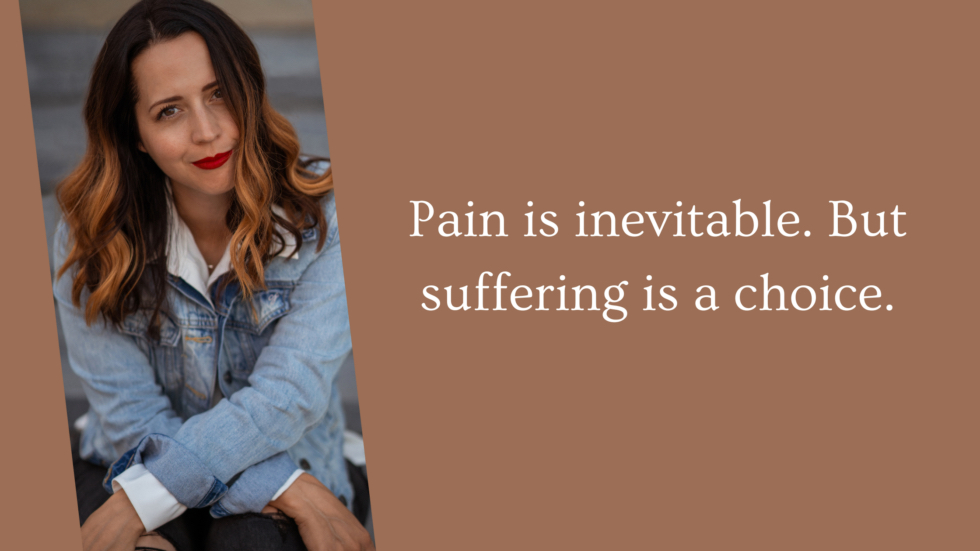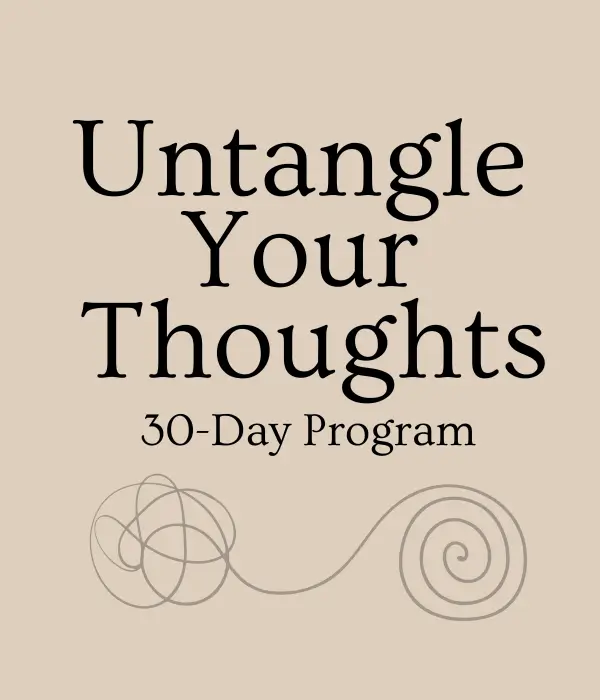Sometimes, we prolong our healing because we wait for others to validate our pain. We want closure from the broken relationship or person who hurt us the most. However, what if you didn’t wait for the closure but allowed the Lord to close it for you? Handling relationship conflict can feel hard and lonely. Community is wonderful to have, but we don’t need to wait for anyone else to validate our pain before we begin to heal.
Learn how to navigate broken relationships and relationship conflict with practical application and God.
By the way, what if I told you your feelings aren’t inherently bad or sinful? You don’t need to fear or suppress them. They can be a guide. If you’re interested, I have a free 3-day study on living by faith while processing emotions. Check it out here!
What Is Relationship Conflict
How do we get to a point in our relationships where there is conflict?
I think we’re getting to the point where we have broken relationships and relationships with conflict. In general, I think it’s a long process. We don’t go into a relationship anticipating that it’s going to end broken. When we go into it, we’re looking for someone with whom we can be real, have accountability, and enjoy life authentically. That’s ultimately what we yearn for: to be known by someone.
It can be absolutely heartbreaking when relationships end abruptly or when they are not able to work through the relationship conflict. But often, we don’t handle conflict appropriately. It may not even always be the fault of one party or another alone when a relationship comes to an end.
But often, we fear conflict, don’t want to approach it, or are just very uncomfortable with it. When we don’t address issues within a relationship and grow through them, we find ourselves just becoming estranged from each other. When fear is present, it’s hard to handle relationship conflict.
Then, when the relationship falls apart, we experience all these different crises of self. I guess you would say, like, what’s wrong with me? What did I do wrong? Does anyone even know me?
We could also experience hostility, anger, frustration, and bitterness toward the other person. And so, you know, it could sometimes be a long road to getting to that point. But I think that a lot of times, it comes from fear or a very uncomfortable feeling when dealing with conflict.
Therefore, relationship conflict often stems from unresolved issues and the fear or discomfort surrounding confrontation. When conflicts are avoided or mishandled, relationships can suffer and eventually break down. This can lead to feelings of self-doubt, anger, and bitterness as individuals grapple with questions about their worth and their ability to be understood by others.
Learn more about how to rebuild trust after conflict in my biblical study! Get your copy here!
Dealing with Relationship Conflict
Pain often causes us to build walls. I have been learning how to keep my love on for people even when there is relationship conflict.
When things start to happen that we didn’t expect or situations arise where there’s pain involved, we do want to shut down and kind of turn away and say, “See, I can’t trust anybody. Nobody cares.” So, how do we keep our love on without shutting down?
I would say that it starts with evaluating or questioning why you’re experiencing that alertness. In any form of counseling, most counselors are now teaching their clients to be very self-aware and aware of their emotions, thoughts, behaviors, and what drives them to do these things.
When we are pulling back for any reason, it’s really good to evaluate, okay, what’s causing me to pull back? What am I feeling? What emotions are going through me right now? How am I responding, not only in my behavior, as far as pulling back, but also, what is my body feeling?
Then, ultimately, what am I thinking about? All of that influences why we’re pulling away. To address it head-on, we have to constantly be in tune with ourselves. Then, we can challenge ourselves to rise above and allow that kindness and vulnerability that we need to show through and keep that relationship going while at the same time expressing our needs for what we want and need.
Processing through broken relationships and relationship conflict will take being intentional.
Therefore, when working through relationship conflict, it’s important to foster open communication and understanding.
- Encourage them to express their thoughts and feelings honestly while actively listening to the other person’s perspective.
- Empathize with their emotions and validate their experiences to create a supportive environment.
- Guide them in identifying the root causes of the conflict and brainstorming potential solutions together.
- Encourage them to approach the situation with empathy and a willingness to compromise.
Conflicts are a natural part of relationships, and working through them can lead to growth and stronger connections.
When you are looking for a Christian mental health coach, you want someone who understands thought patterns and strategies for overcoming what’s holding you back, not just because they are certified to teach them but because they have lived through it. Book your free consultation here.
Walk Out the Process of Handling Relationship Conflict
We tend to shut other people out, even if they’re not the ones who hurt us. Maybe you are wondering what this looks like from a biblical perspective.
Kurt Thompson studies interpersonal neurobiology. He says that community is a container in which we can grow in our relationship with the Lord. It’s so fascinating to see how it affects brain chemistry and everything when we are in relationships.
In our relationship with the Lord, if there’s a specific sin in my life that keeps coming up, that I run from, that I am afraid to approach with the Lord, that I’m ashamed of, then that is clearly going to hinder me in other relationships with other people. It will not only hinder me, but it will affect how I view myself and the value that I have in relationships with other people.
So we can really look both ways, not only at our relationship with the Lord and see how we approach that relationship with him. But we can also look at relationships with other people and see how those relationships play out, which can really show us what we may not even realize about how we perceive the Lord.
From a Biblical sense, we can look at relationships as a form of sanctification, any form of relationship. So much growth has to happen with that. But part of that in this world, on this side of the kingdom, is going to be pain. We must become okay with the knowledge that at some point, people are going to hurt us, and at some point, we are going to hurt someone else.
We have to walk through that in a merciful, graceful way to grow. It is a philosophy of relationships that many people just don’t have. So, just recognize that pain is going to be a part of that. Walking out unresolved conflict helps us grow and mature in the Lord.
I often say: “Pain is a place of visitation but not a place of habitation. ” When we acknowledge that pain is going to be a part of our lives in relationships, we can decide if suffering is going to be a part of that or not.
So, how are we going to deal with the pain that comes up?
From a biblical perspective, a few key points are important in relationship conflict:
- Prayer and Reflection: Spend time in prayer, seeking guidance from God and reflecting on scriptures that speak to forgiveness and reconciliation (e.g., Matthew 5:23-24, Ephesians 4:32).
- Seeking Counsel: To navigate the relationship conflict, seek biblical guidance and wisdom from a trusted pastor, mentor, or Christian counselor. I help my clients through this as their Christian Mental Health Coach.
- Humility and Grace: Approach the other person involved in the relationship conflict with humility, acknowledging their own faults and shortcomings (Matthew 7:3-5), and extending grace and forgiveness, even if they feel wronged.
- Reconciliation: If possible, reconcile following the biblical model outlined in Matthew 18:15-17, which involves addressing the issue directly with the other person, seeking resolution, and, if necessary, involving mediators or witnesses from the community. Learn more about the process of rebuilding trust in my biblical study!
Tips for Handling Conflict and Getting Closure
Sometimes, we go into relationships thinking they may be perfect. And so as soon as somebody says something we don’t agree with or upsets us, we want to run. We’re not saying that, but we’re thinking, “Well, this person hurt me. So they must not love me.” Being able to say that pain is going to come, but how we deal with it is important.
In my book Face Off with Your Feelings, I discussed how you can find closure with the Lord, and that’s all that you need—versus your parent, your spouse, or whoever—to close that for you.
Forgiveness does not take the part of the other person. The beauty of it is that when we are called to forgive, the other person is not required to be a part of that; it takes only us and the Lord. Just remember that it is a choice.
Our feelings may not initially follow. It could be daily or hourly, sometimes monthly, and maybe progressively yearly. However, it is going to be a constant choice that you make to forgive that person, and you will often remind yourself that it may.
A lot of people think that forgiveness means moving on and pretending like it never happened. And that’s far from the truth. We can acknowledge the pain, deal with the pain that is caused, and grow from the pain, but we must allow that to not taint our relationships moving forward.
Releasing them from that to the best of our ability—I would say that’s probably a big step. Sometimes, if the other person is not a part of that forgiveness process, I will actually have my client write a letter of forgiveness to the other person. They know ahead of time that they will never send it or they will never give it.
But it’s just a way of this that is very cathartic for them to be able to say what they need to say and get it out without bringing that other person in. It can be very healing. Or you can take the form of therapy, rather than writing to the other person that’s hurt you, you can write to the Lord, in a prayer form, almost asking him to help guide you through some of that. So journaling can be really good for working through a lot of forgiveness and handling the relationship conflict.
Finding closure in a relationship from a biblical perspective involves seeking guidance from scripture and relying on God’s wisdom and grace. Here are some tips:
- Prayer and Surrender: Begin by praying for guidance and strength. Surrender the situation to God, trusting in His plan and timing for your life (Proverbs 3:5-6).
- Forgiveness: Practice forgiveness, both for yourself and for the other person involved. Remember Jesus’ example of forgiveness on the cross (Ephesians 4:32, Colossians 3:13).
- Letting Go of Bitterness: Release any bitterness or resentment you may be holding onto. Bitterness can poison relationships and hinder your own spiritual growth (Hebrews 12:15).
- Seeking Wisdom: Seek wisdom from scripture and from wise counselors, such as pastors or mentors, who can offer biblical insight and perspective (Proverbs 19:20).
- Reflecting on God’s Love: Reflect on God’s unconditional love for you. Remember that you are deeply loved and valued by Him, regardless of your relationship status (Romans 8:38-39).
- Finding Closure in God: Ultimately, find closure in your relationship with God. Seek fulfillment and satisfaction in Him, knowing that He is enough to meet all your needs (Philippians 4:19).
- Moving Forward with Hope: Trust that God has a purpose and plan for your life, even in the midst of relationship endings. Look forward with hope and anticipation for what He has in store for you (Jeremiah 29:11).
By following these biblical principles, you can find closure in your relationship with grace, forgiveness, and a deepening reliance on God’s love and guidance.
Roadblocks with Resolving Conflict
Ultimately, it boils down to sin, clearly, but I see a lot of times that fear is one of the biggest reasons that we don’t deal with it appropriately. And that can be a fear of anything, to be honest, such as fear of being known, fear of being hurt again, fear of feeling like I don’t matter, or maybe a fear that I’m not good enough.
Some of that could even be pride rejection, not wanting to be criticized, or sometimes just running from a relationship because we don’t want to deal with it. So, I think in many cases, that often boils down to fear, and then that can be seen coming out in many different ways.
We don’t realize that we’re doing this. But the more we can become aware as I discussed earlier, the more we can begin to interrupt those patterns. This is a great opportunity to heal from unresolved conflict.
If you are really wrestling with even believing that God loves you because of the pain that you have experienced in conflict, I recommend being very in tune with yourself.
Go back to what is causing you to fear being in a relationship and how that comes out. But what’s causing you to be uncomfortable? Is it feelings that you’re having? Are there specific thoughts that you’re having? Do you question yourself? Does it bring back lies from previous experiences? How am I handling this unresolved conflict or broken relationship?
There are so many different things. But being in tune with yourself and knowing what you’re feeling, why you’re feeling it, and then how it’s coming out is so important for being able to move forward because then you can know, this is why I’m doing this. And this is the challenge that I have.
Then, I can move forward in that challenge. I think that being in a community is so important. We see it in Scripture, like the Lord in His triune. Nature has community within one. And so it’s part of being created in the image of God to want to be known and loved and to be in community with other people.
It is not possible to think that growth can happen outside of relationships. Pursuing healthy, vulnerable, authentic relationships is so important for growth. I encourage women to do some soul-searching about what’s going on and why. Relationship conflict can help you grow in your relationship.





